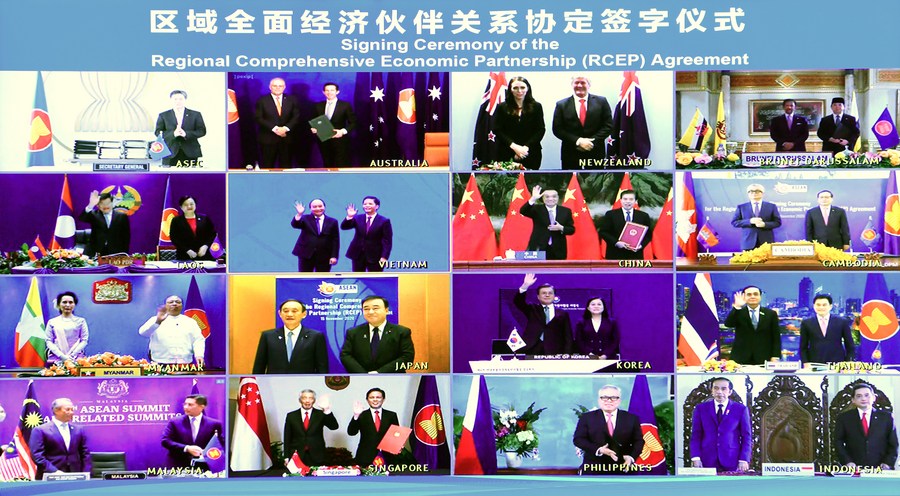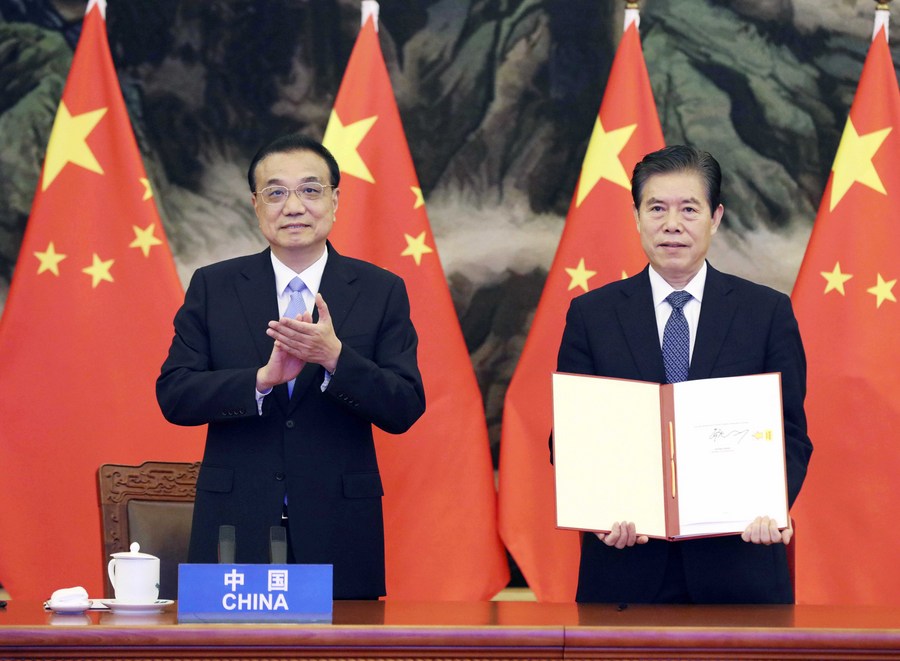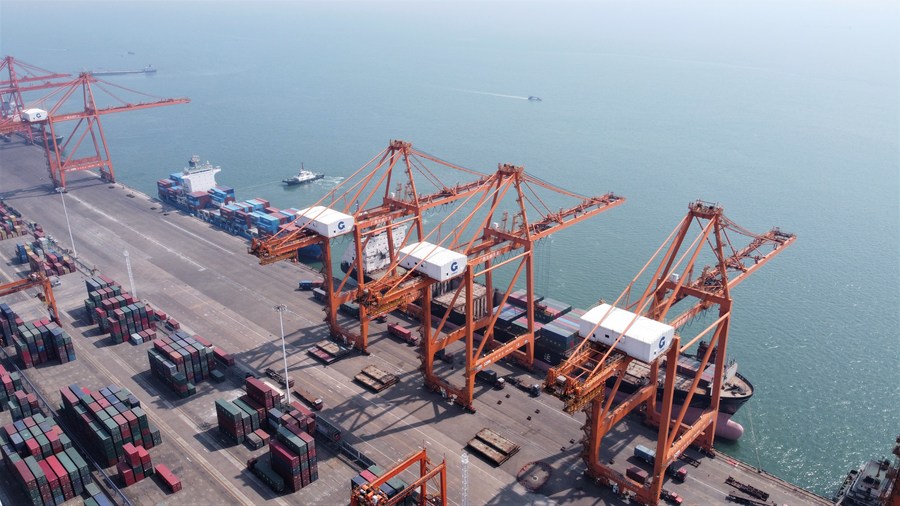World's biggest trade pact signed, "victory of multilateralism, free trade"
-- The RCEP agreement covers a market of 2.2 billion people, or almost 30 percent of the world's population, with a combined GDP of 26.2 trillion U.S. dollars or about 30 percent of global GDP.
--The signing of RCEP is not only a monumental achievement in East Asian regional cooperation, but more important, a victory of multilateralism and free trade.
--As the most promising FTA covering the largest population and most diverse membership, RCEP will inject new impetus into development and prosperity of the region, and will contribute to the recovery and growth of the world economy.
By Xinhua Writers Bai Jie, Pan Jie and Cao Jiayue
BEIJING, Nov. 15 (Xinhua) -- After eight years of negotiations, 15 Asia-Pacific countries on Sunday signed the Regional Comprehensive Economic Partnership (RCEP), the world's biggest trade pact, a move considered a massive coup for regional economic integration, multilateralism and free trade.
"This is not only a monumental achievement in East Asian regional cooperation, but more important, a victory of multilateralism and free trade," said Chinese Premier Li Keqiang at the fourth RCEP Summit held via video link.

Chinese Premier Li Keqiang and leaders of other countries attend the signing ceremony of the Regional Comprehensive Economic Partnership (RCEP) agreement after the fourth RCEP Summit, which is held via video link, Nov. 15, 2020. Li attended the summit at the Great Hall of the People in Beijing on Sunday. Chinese Commerce Minister Zhong Shan signed the agreement on behalf of China. (Xinhua/Zhang Ling)
Leaders from the 15 nations, including 10 member countries of the Association of Southeast Asian Nations (ASEAN) and China, Japan, the Republic of Korea (ROK), Australia and New Zealand, witnessed the signing of the pact after the summit.
Calling the pact "the most promising FTA covering the largest population and most diverse membership," Li said the signing "will inject new impetus into development and prosperity of the region, and will contribute to the recovery and growth of the world economy."
MILESTONE IN REGIONAL ECONOMIC INTEGRATION
The RCEP agreement covers a market of 2.2 billion people, or almost 30 percent of the world's population, with a combined GDP of 26.2 trillion U.S. dollars or about 30 percent of global GDP.
It is an unprecedented regional trading arrangement that comprises a diverse mix of developed, developing and least developed economies of the region, according to a joint statement issued after the summit.
The agreement "is critical to the region's response to the COVID-19 pandemic and will play an important role in building the region's resilience through an inclusive and sustainable post-pandemic economic recovery process," leaders said in the statement.
"The trade pact marks a new milestone in regional economic integration in East Asia," Chinese Vice Commerce Minister Wang Shouwen told reporters Sunday afternoon in Beijing.
According to Wang, the agreement covers 20 chapters, including the market access of goods and services trade and investment as well as regulations for trade facilitation, intellectual property rights, e-commerce, and others.
The pact will vigorously boost confidence in regional trade and investment, enhance the ability of all parties to cooperate in fighting the pandemic, hasten the economic recovery in all countries, and promote the long-term prosperity and development of the region, Wang said.

Aerial photo taken on May 29, 2020 shows a view of the China-Laos Railway under construction on the outskirts of Vientiane, Laos. (Photo by Pan Longzhu/Xinhua)
Cao Jing, deputy secretary-general of the Trilateral Cooperation Secretariat, forecast that the signing of RCEP will also help advance the negotiations on the trilateral free trade agreement among China, Japan and the ROK as the leaders of the three countries agreed to speed up the FTA negotiations based on the RCEP negotiations last December.
Cambodia's Commerce Ministry Secretary of State and spokesman Seang Thay said the pact would promote trade liberalization in the region, give the member countries greater market access and further develop the ties in economy, trade and investment.
MULTILATERALISM, FREE TRADE "RIGHT WAY FORWARD"
The RCEP agreement was signed at a time when the COVID-19 pandemic is still raging across the globe, and the world economy is in a serious recession with contracted global trade and investment and rising protectionism and unilateralism.
Calling the signing of RCEP "light and hope through dark clouds," the Chinese premier said at the summit that it shows that "multilateralism and free trade are the right way forward, and remain the right direction for promoting the growth of the world economy and the progress of humanity."
"It also shows that in the face of challenges, countries should choose solidarity and cooperation over conflict and confrontation, and look out for each other in the spirit of partnership rather than follow a beggar-thy-neighbor approach or sit by and do nothing," Li said.
"The signing of the RCEP agreement proves to the world that openness and cooperation are a sure path toward mutual benefits," Li said.

Chinese Premier Li Keqiang attends the signing ceremony of the Regional Comprehensive Economic Partnership (RCEP) agreement after the fourth RCEP Summit, which is held via video link, at the Great Hall of the People in Beijing, capital of China, Nov. 15, 2020. Chinese Commerce Minister Zhong Shan signed the agreement on behalf of China. (Xinhua/Liu Weibing)
Wang said RCEP supports trade and investment liberalization and facilitation with practical actions and will boost confidence in the global economy.
The signing of the pact shows that all members are committed to cutting down tariffs, opening up markets and reducing barriers of standards, which sends a strong signal against unilateralism and protectionism, and effectively supports free trade and the multilateral trading system, said the vice commerce minister.
Ruan Zongze, executive vice president of the China Institute of International Studies, said the RCEP trade pact accommodates the broadest possible interests, conditions and priorities of different countries, embodies the spirit of multilateralism, and sends a clear message of East Asian countries working together for shared prosperity.
During the RCEP summit, leaders of participating countries agreed that RCEP remains open to India, which was due to sign but pulled out last year, and welcomed India to join the pact soon.
FACILITATING CHINA'S DUAL CIRCULATION PATTERN
Analysts said that the signing of RCEP would facilitate China's endeavor of a new "dual circulation" development pattern, where domestic and overseas markets reinforce each other, with the domestic market as the mainstay.
All RCEP members are China's important economic and trade partners. Statistics show that from January to September 2020, China's total trade volume with other RCEP members reached 1.055 trillion U.S. dollars, accounting for about one-third of China's total foreign trade volume.

Aerial photo taken on April 15, 2020 shows Qinzhou Port in Qinzhou City, south China's Guangxi Zhuang Autonomous Region. (Xinhua/Lei Jiaxing)
"The pact will help expand China's export market, meet the needs of domestic import consumption, and strengthen regional industrial and supply chains," said Wang.
It contributes to stabilizing foreign trade and investment and effectively supports China's new development pattern of "dual circulation," he added.
During the summit, Li expressed the hope that the parties involved would complete their domestic approval procedures as soon as possible to allow the trade pact to take effect and benefit the enterprises and the people at an early date.
According to Wang, the RCEP agreement will come into force only if at least nine members enact it, including at least six ASEAN members and at least three countries out of the other five non-ASEAN countries.
"China will work with all parties to let the pact become effective soon," Wang said.
(Xinhua reporters Yu Jiaxin, Wen Xin, Mao Pengfei, Jiang Shengxiong, Lu Rui and Luo Xin contributed to this story; Video reporters: Tian Ming, Pang Yuanyuan, Lu Rui; Video editor: Li Jingchen)




